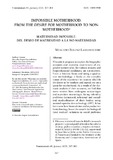Mostrar el registro sencillo del ítem
Impossible motherhood: from the desire for motherhood to non-motherhood
| dc.creator | Bogino Larrambebere, Mercedes | es_ES |
| dc.date.accessioned | 2023-01-17T19:05:40Z | |
| dc.date.available | 2023-01-17T19:05:40Z | |
| dc.date.issued | 2023 | |
| dc.identifier.citation | Bogino Larrambebere, M. (2023). Impossible motherhood: From the desire for motherhood to non-motherhood. Feminismo/s, 41, 357-383. Rethinking Motherhood in the 21st Century: New Feminist Approaches [Monographic dossier]. María Dolores Serrano Niza & Inmaculada Blasco Herranz (Coord.). https://doi.org/10.14198/ fem.2023.41.14 | en |
| dc.identifier.issn | 1696-8166 | |
| dc.identifier.uri | https://hdl.handle.net/2454/44565 | |
| dc.description.abstract | Este artículo explora los relatos biográficos de mujeres cisgénero que, por distintas motivaciones y condicionantes biopsicosociales, no son madres. Desde una mirada feminista y a partir de una metodología cualitativa, trata de aproximarse a la complejidad de la experiencia de mujeres que han sentido el deseo de ser madres e inician la búsqueda de la maternidad. Como resultado del análisis temático de sus relatos, encontramos que algunas mujeres han vivido abortos espontáneos y abortos de repetición, enfrentándose a problemas de infertilidad (estructural, relacional y social), así como a la medicalización del cuerpo a través de las tecnologías de reproducción humana asistida (TRHA). Se constata cómo la biomedicina y la biotecnología reproductiva alientan la búsqueda de soluciones biológicas (y médicas) a problemas sociales que se relacionan con la infertilidad estructural. Además, se enfatiza la importancia dada a vivir el «duelo de la no-maternidad» compuesto por distintos procesos que son socialmente denegados o desautorizados —como el duelo gestacional, el duelo genético o el duelo institucional— y realizar pequeños rituales de despedida. Se evidencia que, tras un proceso de aceptación de la no-maternidad y autoconocimiento, las protagonistas redefinen su identidad materializada en nuevos proyectos. Finalmente, se pone de manifiesto la relevancia que adquieren los grupos de ayuda mutua (GAM) para compartir marcos de referencia, forjar relaciones de empatía y redes de reciprocidad. En las conclusiones se destaca cómo el tránsito de la «maternidad imposible» a la no-maternidad es un proceso subjetivo, de reflexión y vivencia corporal y emocional, que permite desafiar, repensar y subvertir las representaciones de la maternidad hegemónica generando nuevas significaciones y prácticas sociales vinculadas a la no-maternidad. | es_ES |
| dc.description.abstract | This article proposes to explore the biographic accounts and everyday experiences of cisgender women who, for various reasons and biopsychosocial conditions, are not mothers. From a feminist focus and using a qualitative methodology, it looks at the complex nature of the experience for women who felt the desire to be mothers and started out on a quest for motherhood. As a result of the thematic analysis of their accounts, we find that some women have undergone miscarriages and repetition miscarriages, facing infertility problems (structural, relational and social) and medicalisation of their bodies using assisted reproduction technology (ART). It has been seen how biomedicine and reproductive biotechnology boost the search for biological (and medical) solutions to social problems related to structural infertility. Furthermore, the importance given to experiencing ‘grief for non-motherhood’, is emphasised, composed of different processes that are socially denied or disenfranchised —such as gestational grief, genetic grief or institutional grief— and performing small rituals to say goodbye. It is demonstrated that, following a process of acceptance of the non-motherhood and self-knowledge, the women in question redefine their identity in new projects. Finally, the relevance of mutual support groups (MSG) is demonstrated as a way of sharing frames of reference, forging empathy relationships and reciprocity networks. The conclusions highlight how the journey from ‘impossible motherhood’ to non-motherhood is a subjective process, involving reflection and a physical and emotional life lesson, that makes it possible to challenge, rethink and overthrow the hegemonic representations of motherhood generating new meanings and social practices bound to non-motherhood. | en |
| dc.description.sponsorship | This text is derived from the R&D+i research project: La paradoja del deber/derecho sobre la crianza: padres custodios y mujeres sin maternidad (CSO2012-39041-C02-02), supervised by José María Uribe at the Public University of Navarre and funded by the Ministry of the Economy and Competition, Government of Spain. | es |
| dc.format.mimetype | application/pdf | en |
| dc.language.iso | eng | en |
| dc.publisher | Universidad de Alicante | es_ES |
| dc.relation.ispartof | Feminismo/s, 2023, 41, 357-383 | es_ES |
| dc.rights | © Mercedes Bogino Larrambebere. This work is licensed under a Creative Commons Attribution 4.0 International. | en |
| dc.rights.uri | http://creativecommons.org/licenses/by/4.0/ | |
| dc.subject | Maternidad | es_ES |
| dc.subject | Aborto espontáneo | es_ES |
| dc.subject | Duelo gestacional | es_ES |
| dc.subject | Infertilidad estructural | es_ES |
| dc.subject | No-maternidades | es_ES |
| dc.subject | Duelo de la no-maternidad | es_ES |
| dc.subject | Motherhood | en |
| dc.subject | Miscarriage | en |
| dc.subject | Gestational grief | en |
| dc.subject | Structural infertility | en |
| dc.subject | Non-motherhoods | en |
| dc.subject | Grief for non-motherhood | en |
| dc.title | Impossible motherhood: from the desire for motherhood to non-motherhood | en |
| dc.title.alternative | Maternidad imposible: del deseo de maternidad a la no-maternidad | es_ES |
| dc.type | Artículo / Artikulua | es |
| dc.type | info:eu-repo/semantics/article | en |
| dc.date.updated | 2023-01-17T09:25:18Z | |
| dc.contributor.department | Sociología y Trabajo Social | es_ES |
| dc.contributor.department | Soziologia eta Gizarte Lana | eu |
| dc.rights.accessRights | Acceso abierto / Sarbide irekia | es |
| dc.rights.accessRights | info:eu-repo/semantics/openAccess | en |
| dc.identifier.doi | 10.14198/fem.2023.41.14 (erróneo) | |
| dc.relation.publisherversion | https://doi.org/10.14198/fem.2023.41.14 | |
| dc.type.version | Versión publicada / Argitaratu den bertsioa | es |
| dc.type.version | info:eu-repo/semantics/publishedVersion | en |






